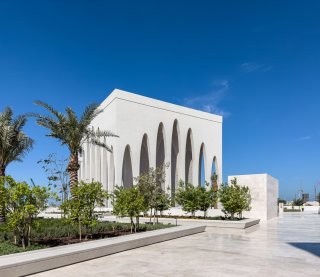Only Regional Cooperation Can Resolve the Israeli-Palestinian Conflict
The future of the Middle East depends not only on the integrity of borders but also on our ability to take a leap of faith and forge a shared regional vision.
The intense fighting in Gaza following the October 7 attack by Hamas is still ongoing. More than 130 Israeli hostages are still being held by Hamas, and the heavy toll on the people of Gaza is growing. Meanwhile, elsewhere in the region, from Yemen to Lebanon to Iraq, tensions are rising and increasing the prospects for the conflict to spill over. In this climate, it might seem premature, but planning for the post-conflict period must begin now.
The ongoing violence shows the urgency of a sustainable solution to the Israeli-Palestinian conflict. Traditionally, resolution efforts focused on direct negotiations between the conflicting parties. However, the Middle East’s evolving strategic reality necessitates a regional solution grounded in regional cooperation and interests, transforming it from a hopeful strategy in the past to a strategic imperative today.
The past three months of conflict have inflicted wounds that will take years to heal, and the challenges ahead are considerable. Yet, we must not succumb to the horrors and despair of war. A proactive, joint approach is essential to forging a better future not only for Palestinians and Israelis but for the entire Middle East.
Decades of unsuccessful negotiations and recent events demonstrate that Israelis and Palestinians alone cannot resolve this conflict. The solution must be regional, combining economic and political measures.
Addressing the immediate humanitarian crisis, the United Arab Emirates has announced plans to establish three desalination plants in Gaza, producing 600,000 gallons of drinking water daily for 300,000 people. Field hospitals and aid from Egypt, Jordan, the UAE, Saudi Arabia, and others are reminders that war’s calamities mask enduring challenges like water and food security that need to be resolved. Sustainable energy sources for Gaza are vital for these to become long-term solutions.
Joint economic development plans for Israel, the West Bank, and Jordan, with participation from other regional players, are crucial. Gaza’s development should not be viewed in isolation but as part of a broader international economic plan. Looking ahead, policies that attract local and international businesses by addressing regulatory barriers, streamlining processes, and offering incentives are key to creating a conducive investment environment that will enable a better future for Gaza.
Major cross-regional infrastructure projects, like the U.S.-led India-Middle East-Europe Economic Corridor, can stimulate economic growth and regional connectivity. A roadmap for infrastructure development should balance short-term and long-term goals.
Politically, there is much work to be done. De-escalation and regional integration are crucial. The Abraham Accords, despite recent strains, remain highly relevant for regional development and stability. However, progress between Israel and Arab states must not leave Palestinians behind. Instead, the goal should be integrating both Israel and the Palestinians into the region. The effectiveness of regional cooperation depends not only on the commitment of regional powers to play a role but also on the willingness of Israelis and Palestinians to negotiate and make concessions. A regional framework would make this easier to achieve.
At the center of this framework is a new regional vision that will assist in reconstructing and developing the area between the Mediterranean Sea and the Jordan River after the war. A natural bridge between the Arab world and Europe, this area has an enormous potential for development and growth. The new vision will aim to stabilize the region in the short term, transform the region into a peaceful and cooperative area in the mid-term, and turn it into a prosperous and economically strategic area in the long term.
Important first steps were taken recently in a workshop in Bonn, Germany, spearheaded by the German Abraham Accords Institute and Bonn University’s Center for Advanced Strategic Security and Integration Studies. This gathering was a melting pot of ideas, bringing together Israelis, Palestinians, Saudis, Emiratis, Bahrainis, and Egyptians—all influential figures and members of MENA2050, an organization striving to create a new regional vision. The workshop’s agenda aimed to architect a new conceptual, regional framework for the Middle East’s post-Gaza war era, a peaceful future where economic revitalization, diplomatic synergy, and innovative progress are keystones.
As tensions escalate, we are reminded that stability and peace require cooperation, even among foes. The future of the Middle East depends not only on the integrity of borders but also on our ability to take a leap of faith and forge a shared regional vision. For lasting peace and security, all parties must prioritize cooperation over conflict, recognizing our collective existence and intertwined future. As people of the region, shaped by its past and invested in its future, we believe that while working with our influential regional networks, we can help shape a new vision to lead our region. This vision will replace instability with cooperation and war with peace.
Eli Bar-On is an Israeli. He serves as the Executive Director of MENA2050 and is a former professor at the Israel National Defense College.
Abdulla Al Junaid is a Bahraini. He is a Geo-Political columnist in Bahrain, the Kingdom of Saudi Arabia, and the United Arab Emirates, and a Non-Resident Fellow at Trends Research & Advisory UAE. He contributes columns on geopolitics, security, and defense in various newspapers in the Arab Gulf.
Abdalaziz Alkhamis is a Saudi journalist and researcher specializing in Islamic movements and the Middle East conflict. He serves as the presenter of “Friendly Fire” on Sky News Arabia and produces the Gulf Talk program at the Arab News Network London.
Sarah Awaidah is a Palestinian. She serves as MENA2050’s Chief Operations Director and Co-founder of MENA Aid, a regional humanitarian coalition.
Dr. Gedaliah Afterman is an Israeli. He is Head of the Asia-Israel Policy Program at the Abba Eban Institute.
Prof. Shlomo Hasson is Israeli. He is a Professor Emeritus at the Hebrew University of Jerusalem and head of the James Shasha Center for Strategic Studies.
Image: Shutterstock.com

